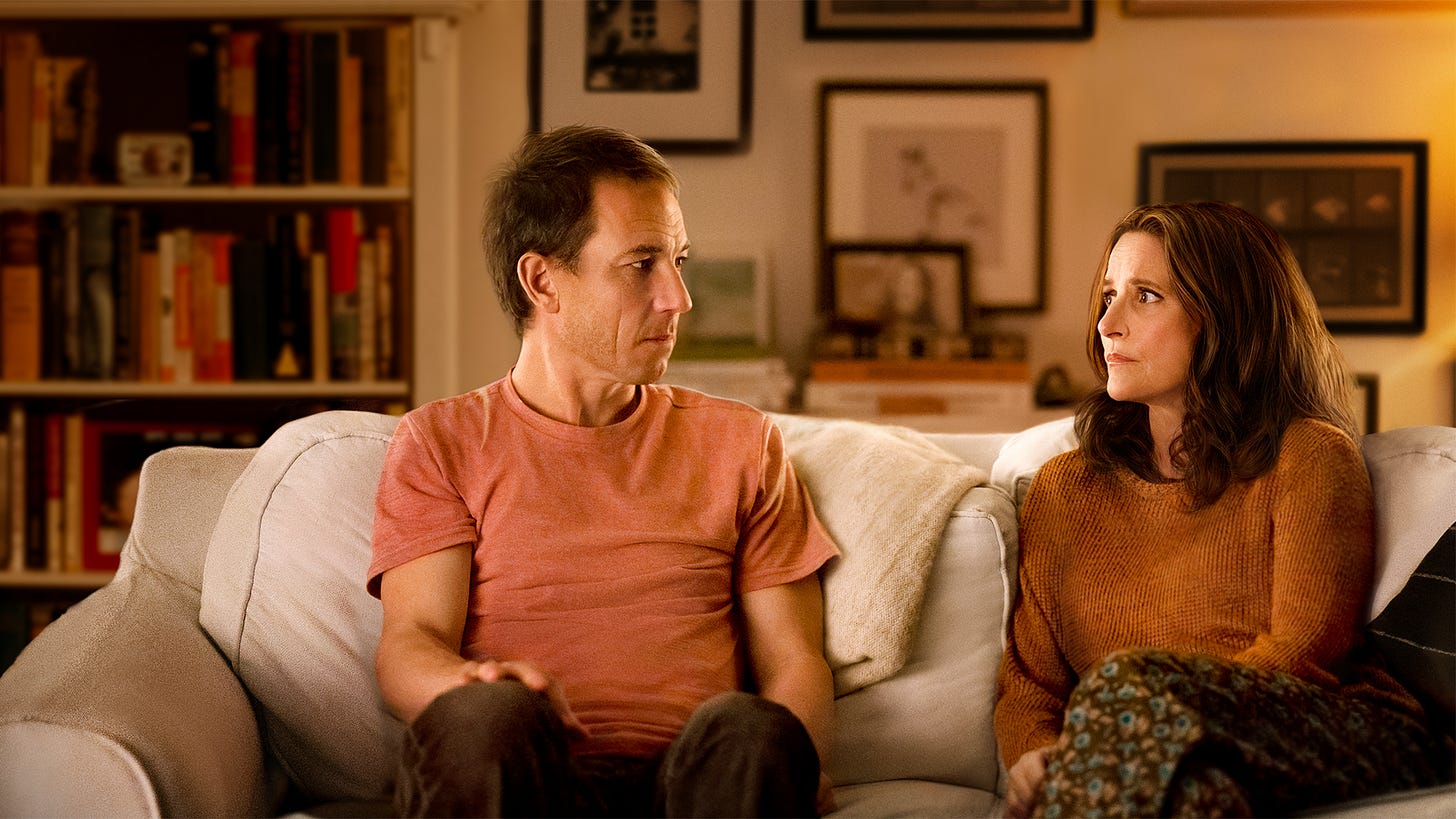You Hurt My Feelings Tries to Show Failure
It doesn’t quite succeed.
Nicole Holofcener’s You Hurt My Feelings is a mid-life crisis movie about the virtues of gentle deceit which feels a tad too deceitful in its gentleness. It’s worth seeing for the excellent cast and witty script, but it would have benefited from a bit less saccharine assurance, and a bit more honest bile.
The movie follows two New York City couples and their various career impasses. Beth (Julia Louis-Dreyfus) is a writer who has published one successful memoir and is having difficulty getting her first novel published. Her husband Don (Tobias Menzies) is an therapist who doesn’t seem to do his clients much good, and her 23-year-old son Eliot (Owen Teague) is in a dead end job at a weed store, writing his first play on the side. Meanwhile her sister Sarah (Michaela Watkins) is an interior decorator whose husband Mark (Arian Moayed) is an unsuccessful actor. When Beth overhears Don admit that he doesn’t like her new book, she is thrown into a spiral of anger, despair, and self-loathing which threatens their marriage.
Beth, and indeed everyone in the movie, is desperate for validation; they all want to be told that they are good at their jobs and at their relationships. That’s why Don pretends to like Beth’s writing; he knows she wants encouragement and wants to feel special. And in standard Hollywood films, everyone does tend to be special. What the characters want is to be told that they’re in one of those films; that their lives are movies in which they are protagonists.
At least at first, You Hurt My Feelings refuses to be that kind of narrative. Instead, it is breezily merciless in displaying the humiliations of growing older and realizing that one is not, after all, particularly wonderful, special, or skilled. There’s a brutal moment when Don tells one of his patients that her difficult boyfriend is similar to her father, and she says that he must have gotten her confused with another patient—which he has. Beth, for her part, discovers that none of the students in her creative writing class have read her book or indeed want to read her book. Someone recognizes Mark in a mall from his one lead movie role, but when Mark asks the guy if he wants a selfie, the fan replies, with some awkwardness, that he does not, and hurries away.
Life is a series of failures, compromises, and more failures, punctured by humiliations. The characters jolly each other along because who is going to tell you that you are worthy if not your loved ones? Little white lies are the only validation most of us get.
That’s a funny, jaded little moral, charming in its bleakness, Unfortunately, the film can’t quite follow through on it. Hollywood conventions (which are also quirky indie comedy conventions) reassert themselves, and the universe insists on validating Beth, and Don, and Sarah, and Mark in small but insistent ways. It’s as if Holofcener, like Don, loves Beth and her other characters too much to let them languish in unpleasant truth, and so arranges for them to all complete their character arc with a win.
I’m not opposed to happy endings in a categorical way. But the movie itself points out that assuring people that they’re wonderful or special can be a way to set them up to fail. My favorite moment in the film is when Don says, with some exasperation, that he doesn’t love Beth for her writing; her success isn’t who she is, or who he cares about. And yet, the movie itself can’t resist giving Beth what she wants, which means it can’t (or won’t) really imagine someone being happy, or having a story worth telling, if their dreams don’t come true to at least some degree. Most of us are mediocre most of the time. Films, though—even independent, insightful films like this, seem afraid to tell us so, lest they hurt our feelings.



I haven't seen the movie, but reading your response reminded me that when I was watching _Your Sister's Sister_, about halfway through I distinctly thought, "I don't want to see these characters suffer. Even if it feels a little unlikely I would prefer a positive ending " and was glad to get one.
I think it's really difficult for people who are actors, writers, filmmakers, etc. to see a happy ending that doesn't involve a validation of their talent in one way or another. In a way it's a self-selecting style of story—if you've reached acceptance that you're not all that good at some creative endeavor, then you probably lack the skill to create a compelling narrative about it. For somebody who's beaten the odds and become a success, writing about failure is likely to be like daring their worst nightmares to become real.
I remember seeing a comedian on television once ask, "What kind of thing scares Stephen King?" I looked at my then-wife and said, "Easy—waking up and finding out that he's still teaching English at a small private school, living in a trailer with his wife and kids, and working in a commercial laundry at night, so that his five decades as a bestselling author were all just a dream. Forget monsters, that's REALLY scary!"